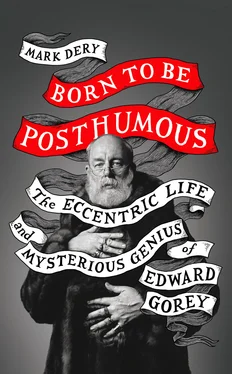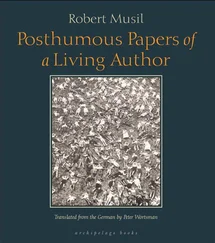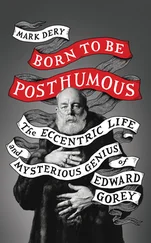I’ve never been one for a messy clinch a thigh to pinch let’s keep calm. 89
By the end of January in ’51, seven months after he graduated, Gorey was over his infatuation with Tony Smith, judging by his comments in a letter to Bill Brandt. His love life, fortunately, was “being nil,” he wrote, now that the “little tin god” he’d worshipped for two years was more or less history, barring the occasional visit to spend the night. 90
Being nil, Gorey decided, was the safest policy. “I am fortunate in that I am apparently reasonably undersexed or something,” he said twenty-nine years later when asked about his sexuality. “I’ve never said that I was gay and I’ve never said that I wasn’t. A lot of people would say that I wasn’t because I never do anything about it.” 91Would they? Is having desires yet not acting on them really the same as not having any desires to act on?
Gorey, ever paradoxical, is saying two contradictory things simultaneously: that he’s asexual (“undersexed”) and that he might be gay but since he never does anything about it, he’s as good as “neutral,” as Compton-Burnett would say. *He’s “fortunate” to be “undersexed,” he says, implying that Fate decreed it. But doesn’t his admission “I am probably terribly repressed” direct our attention to what, exactly, he’s repressing? 92“Every now and then someone will say my books are seething with repressed sexuality,” he conceded. 93
In later life, when Gorey talked about sex, it was either with Swiftian disdain for its panting, grunting preposterousness—“No one takes pornography seriously,” he scoffed—or with Victorian mortification at the very mention of the unmentionable. 94When he talked about love, it was always in the past tense, as a farcical calamity that had befallen him, the sort of thing insurance claims adjusters file under Acts of God, like the flattening of the picnickers by the Wobbling Rock in The Willowdale Handcar . “You don’t choose the people you fall in love with,” he told an interviewer in 1980. 95
In any event, his romantic imbroglios weren’t true love, he implied, but mere “infatuations.” Infatuations are a distinguishing characteristic of sexual immaturity—the stuff of adolescent crushes and teen-idol worship. Narcissistic at heart, they offer romance without the grunt work of relationship building, love without the hairy horrors of sex. “When I look back on my furious, ill-considered infatuations for people,” said Gorey, “they were really all the same person.” 96Of course they were: the objects of our obsessions are ideal types, spun from fantasy. “I thought I was in love a couple of times, but I rather think it was only infatuation,” said Gorey in 1992. “It bothered me briefly, but I always got over it. I mean, for a while I’d think, after some perfectly pointless involvement that was far more trouble than it was worth—I’d think, ‘Oh God, I hope I don’t get infatuated with anybody ever again.’ … I realized I was accident-prone in that direction anyway, so the hell with it.” 97
Was it his traumatic two years of worshipping Tony Smith that made Ted say to hell with love, and even sex, forever? Larry Osgood thinks Gorey swore off sex long before he got to Harvard. “He did tell me—because we were close friends, and we would talk about these things—that he once had a sexual experience in his late teens, I think. And he hadn’t liked it. And that was that. He wasn’t going to do that again.” Gorey didn’t offer any details about the incident, but Osgood is convinced, from his intimate knowledge of Ted’s emotional life, that it must have been a same-sex experience.
But whether it was a traumatic sexual encounter in his teens or his tempestuous affair with Tony Smith at Harvard that put Ted off sex, Osgood is convinced “there was more choice in his abstinence than biology.” Gorey “didn’t want the distractions of emotional engagements,” he says, “which would be messy, and he might get hurt, and in fact he had been hurt.” John Ashbery said something strikingly similar when I asked him for his recollections of Gorey at Harvard. “There was something very endearing about him, almost childlike,” Ashbery recalled. “At the same time, I feel that he was somehow unable and/or unwilling to engage in a very close friendship with anyone, above a certain good-humored, fun-loving level…. I had the impression that he had constructed defenses against real intimacy, maybe as a result of early disappointments in friendship/affection.” 98
At the same time, Osgood thinks Gorey was being honest when he said that relationships are a distraction from the writing desk and the drawing board. An aesthete to the end, Gorey lived for Art, in the opinion of the New Yorker writer Stephen Schiff, who described him as someone who “cultivated the life of a vestal, the anchoritic handmaiden of his art.” 99“It’s hard enough to sit down to work every day, God knows, even if you are not emotionally involved,” Gorey told an interviewer. “Whole stretches of your life go kerplunk when that happens.” 100
Unsurprisingly, Gorey’s grades had gone kerplunk during his “furious, ill-considered infatuation” with Tony Smith. Assistant dean Harrower notified him, on March 4 of ’49, that he was on academic probation. As always, he managed to pull himself out of his death spiral: by July, he’d been relieved from warning, as the official notification put it.
He rallied his creative energies, too. Sometime between 1948 and ’50, he created three little gems of commercial illustration, flawlessly executed cover designs for Lilliput , a British men’s monthly that offered a pre- Playboy potpourri of humor, short stories, arts coverage, cartoons, and, daringly, soft-core “art nudes” depicting female models cavorting— aesthetically, mind you—on beaches or in bohemian artists’ studios. Whether his covers ever appeared in print or were just fodder for his commercial-illustration portfolio isn’t known. The looming threat of graduation had concentrated his mind on the necessity of making a living, someday soon.
Gorey did submit his work to at least one publication outside Harvard. A rejection letter from the New Yorker , dated May 8, 1950, and signed “Franklyn B. Modell,” thanks him, in the usual perfunctory way, for letting the magazine see his drawings. Pleasantries out of the way, Mr. Modell gets down to business: “While I readily recognize their merit, I’m afraid they are not suitable for The New Yorker . The people in your pictures are too strange and the ideas, we think, are not funny…. By way of suggestion may I say that drawings of a less eccentric nature might find a more enthusiastic audience here.” 101
This was the New Yorker of Harold Ross, the founding editor, who scolded E. B. White about his use of the unthinkably vulgar phrase “toilet paper,” so “sickening” it “might easily cause vomiting”; home to cartoonists such as Peter Arno, an upper-crust East Coaster whose covers and single-panel gags took little notice of the Depression, the war, or other unpleasantries, except as punch lines. 102Arno went down well with a dry martini at the Stork Club; Gorey’s camp-gothic eccentricities, not so much.
(Happily, Gorey followed his instincts and had the satisfaction, forty-three years later, of seeing his work appear in the pages, and ultimately on the cover, of a New Yorker that was ready, at last, for the amusingly unfunny. Shortly after his death, the magazine dedicated its end page, by way of an elegy, to a Gorey illustration.)
Gorey graduated from Harvard on June 22, 1950, with an AB in Romance languages and literatures. His final report card records an A in English, a C in French, and a B in history, an appropriately erratic ending to an academic career that had zigzagged all over the place.
Читать дальше












